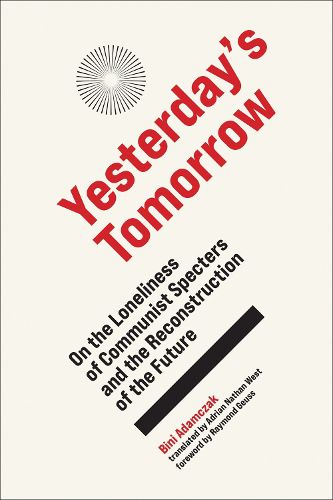Readings Newsletter
Become a Readings Member to make your shopping experience even easier.
Sign in or sign up for free!
You’re not far away from qualifying for FREE standard shipping within Australia
You’ve qualified for FREE standard shipping within Australia
The cart is loading…






How the communist revolution failed, presented in a series of catastrophes.
The communist project in the twentieth century grew out of utopian desires to oppose class structures and abolish oppression. The attempts to realize these ideals, however, became a series of colossal failures. In Yesterday's Tomorrow, Bini Adamczak examines these catastrophes, proceeding in reverse chronological order from 1939 to 1917- the Hitler-Stalin Pact, the Great Terror of 1937, the failure of the European Left to prevent National Socialism, Stalin's rise to power, and the bloody defeat of the rebellion at Kronstadt. In the process, she seeks a future that never happened.
If Adamczak framed communism as a fairy tale with the possibility of a happy ending in her earlier book Communism for Kids, here she offers a tragedy for grownups. She describes the deportation of exiled anti-fascists back to Nazi Germany-a betrayal of communists by communists; the initial incredulity of European Communists at the news of the Hitler-Stalin pact; Stalin's state socialist terror plan, with quotas for executions instead of crops; the disappearance of class and the emergence of tactical and economic calculus; the withering into unrecognizability and impossibility of the revolution's successes; and the cheap promise that "next time it will be democratic." What weighs on the possibility of communist desire, Adamczak writes, is not just the end of history, but first and foremost, the end of the revolution. Not just 1989, but also, even more so, 1939, 1938, and back to 1924, to 1917. Only if we understand this history can we work toward a better future.
$9.00 standard shipping within Australia
FREE standard shipping within Australia for orders over $100.00
Express & International shipping calculated at checkout
How the communist revolution failed, presented in a series of catastrophes.
The communist project in the twentieth century grew out of utopian desires to oppose class structures and abolish oppression. The attempts to realize these ideals, however, became a series of colossal failures. In Yesterday's Tomorrow, Bini Adamczak examines these catastrophes, proceeding in reverse chronological order from 1939 to 1917- the Hitler-Stalin Pact, the Great Terror of 1937, the failure of the European Left to prevent National Socialism, Stalin's rise to power, and the bloody defeat of the rebellion at Kronstadt. In the process, she seeks a future that never happened.
If Adamczak framed communism as a fairy tale with the possibility of a happy ending in her earlier book Communism for Kids, here she offers a tragedy for grownups. She describes the deportation of exiled anti-fascists back to Nazi Germany-a betrayal of communists by communists; the initial incredulity of European Communists at the news of the Hitler-Stalin pact; Stalin's state socialist terror plan, with quotas for executions instead of crops; the disappearance of class and the emergence of tactical and economic calculus; the withering into unrecognizability and impossibility of the revolution's successes; and the cheap promise that "next time it will be democratic." What weighs on the possibility of communist desire, Adamczak writes, is not just the end of history, but first and foremost, the end of the revolution. Not just 1989, but also, even more so, 1939, 1938, and back to 1924, to 1917. Only if we understand this history can we work toward a better future.